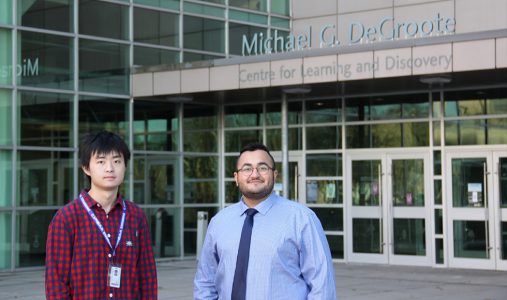Innovating with empathy: Student-led research team earns silver for novel bacterial treatment

The McMaster Synthetic Biology Research Team (known as McMaster SynBio) is a student-led research team that gathers passionate undergraduate students to participate in synthetic biology wet lab, dry lab and public outreach initiatives.
BY Christine Rankin
December 14, 2021
The McMaster SynBio Team has received a silver medal at iGEM (International Genetically Engineered Machine), the world’s largest synthetic biology competition and conference, for their biological therapy project targeting inflammatory bowel disease (IBD).
The student-led research team of interdisciplinary undergraduates says they were guided by compassion and drive for innovation as they focused on developing a novel bacterial treatment for the disease.
Co-presidents Kian Yousefi Kousha, a fourth-year honours neuroscience student, and Hugo Yan, a first-year MSc student who recently graduated from the Biomedical Discovery and Commercialization program, spearheaded the group.
McMaster SynBio’s project focused on using bacteria therapies to target adherent invasive Escherichia coli (AIEC), a bacterial strain associated with causing and exacerbating IBD.
The team not only built on past scientific research and veered from a traditional approach to explore untapped strategies, but also kept their concern for social impact at the forefront.
“IBD patients have insurance costs that are almost two times greater than normal insurance costs. We have children with IBD who have shown to be disengaged in school because of bullying by their classmates…These issues together, inspired us to take on this challenge and to contribute to finding a cure for IBD – to take action,” said Yousefi Kousha.
The team was among more than 370 teams from across the world that gathered virtually at the 2021 International Genetically Engineered Machines (iGEM) Giant Jamboree. Starting in May and concluding in November, the competition challenges students to tackle real-world challenges with biological systems.
They achieved a silver designation for their work – the best results ever recorded by a McMaster University team.

Unable to access in-person labs due to the COVID-19 pandemic, the students developed a biological circuit design and experimental workflow remotely.
The proposed genetic circuit detects the inflammation marker nitric oxide and a pathogen-specific quorum sensing factor named autoinducer-3. When activated, the genetic circuit expresses two bacteriocins – colicin E1 and E9 – that can selectively eliminate the AIEC.
Supervisor and principal investigator Zeinab Hosseinidoust, assistant professor in chemical engineering, applauded the students’ success and independent pursuit of the scientific process.
Vince Leung, assistant professor in chemical engineering, also provided support for mathematical modelling to predict the outcomes of the design.
“You can see me beaming with pride…I’m just amazed at seeing how much they’ve achieved,” said Hosseinidoust.
For a year-and-a-half, students engaged with the community to educate the public on synthetic biology and IBD, as well as pursued their research in a completely virtual environment.
The students hope to expand the scope of their team even further in order to incorporate students across faculties and recognize various potentials of their project.
Wet lab advisor Kyle Jackson – a PhD student in chemical engineering that specializes in IBD and the development of novel therapies – said the key is that the project has legacy potential.
He stressed how the upfront work creates a pathway to develop the bacteria and translate it into real-world clinical results later on.
“It’s very novel. Probiotics have been touted as one of the potential solutions to treating gut-based diseases, including IBD and other microbial-driven diseases…I was very, very proud of the work they did, despite all the challenges with COVID-19.”
“For all we know, in 10 years time, the work that we did for this year’s project with this novel probiotic hopefully could be turned into something that is actually commercializable and provided to patients.”
The iGEM model is so exemplary that it has been integrated into a course within the joint iBioMed program across the Faculties of Engineering and Health Sciences. IBEHS 2P03 is taught by Hosseinidoust and Leung and encourages engineering design with biological parts.
The team is grateful for support received through the Science Initiative Fund by the McMaster Science Society, The Michael G. DeGroote Institute for Infectious Disease Research (IIDR), the Office of the President, and The Society for Canadian Women in Science and Technology.
The students also closely collaborated with the University of Thessaly and King’s College London’s iGEM teams on research and public engagement initiatives.
“We want to thank Dr. Hosseinidoust, Kyle Jackson, and Dr. Leung. Their support has been crucial to the development and completion of this project, especially with a lot of the troubleshooting and pointing us to the direction of the right resources. It has been essential for our achievement of a silver medal,” said Yan.


